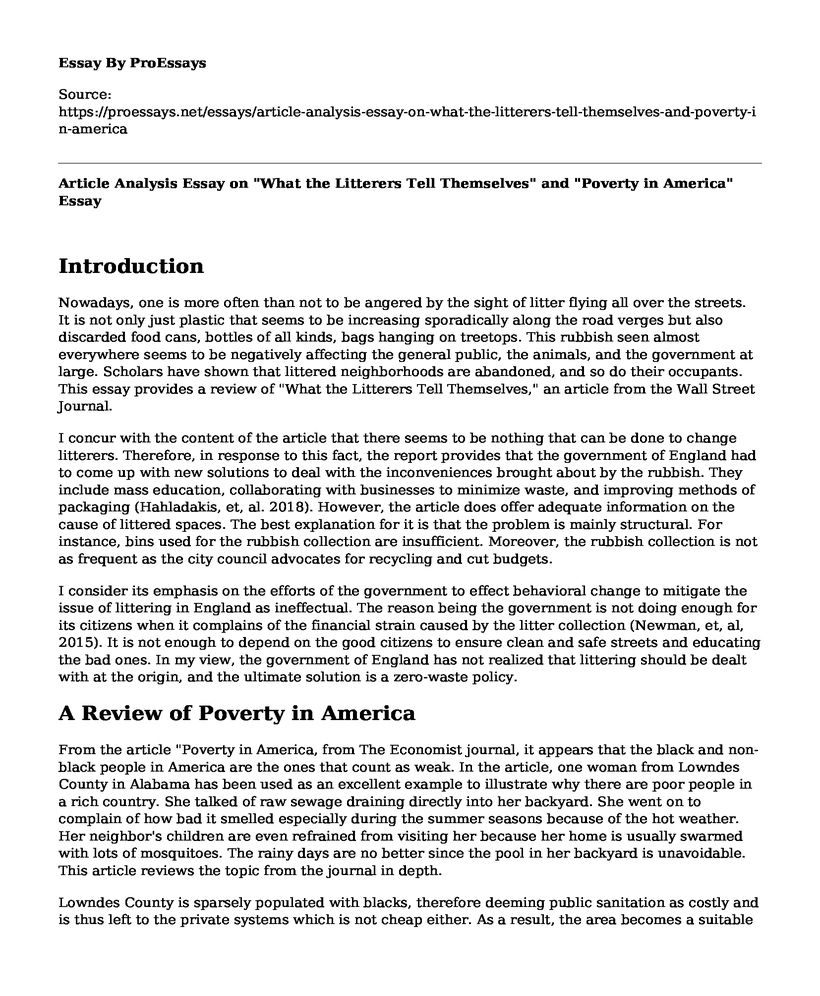Introduction
Nowadays, one is more often than not to be angered by the sight of litter flying all over the streets. It is not only just plastic that seems to be increasing sporadically along the road verges but also discarded food cans, bottles of all kinds, bags hanging on treetops. This rubbish seen almost everywhere seems to be negatively affecting the general public, the animals, and the government at large. Scholars have shown that littered neighborhoods are abandoned, and so do their occupants. This essay provides a review of "What the Litterers Tell Themselves," an article from the Wall Street Journal.
I concur with the content of the article that there seems to be nothing that can be done to change litterers. Therefore, in response to this fact, the report provides that the government of England had to come up with new solutions to deal with the inconveniences brought about by the rubbish. They include mass education, collaborating with businesses to minimize waste, and improving methods of packaging (Hahladakis, et, al. 2018). However, the article does offer adequate information on the cause of littered spaces. The best explanation for it is that the problem is mainly structural. For instance, bins used for the rubbish collection are insufficient. Moreover, the rubbish collection is not as frequent as the city council advocates for recycling and cut budgets.
I consider its emphasis on the efforts of the government to effect behavioral change to mitigate the issue of littering in England as ineffectual. The reason being the government is not doing enough for its citizens when it complains of the financial strain caused by the litter collection (Newman, et, al, 2015). It is not enough to depend on the good citizens to ensure clean and safe streets and educating the bad ones. In my view, the government of England has not realized that littering should be dealt with at the origin, and the ultimate solution is a zero-waste policy.
A Review of Poverty in America
From the article "Poverty in America, from The Economist journal, it appears that the black and non-black people in America are the ones that count as weak. In the article, one woman from Lowndes County in Alabama has been used as an excellent example to illustrate why there are poor people in a rich country. She talked of raw sewage draining directly into her backyard. She went on to complain of how bad it smelled especially during the summer seasons because of the hot weather. Her neighbor's children are even refrained from visiting her because her home is usually swarmed with lots of mosquitoes. The rainy days are no better since the pool in her backyard is unavoidable. This article reviews the topic from the journal in depth.
Lowndes County is sparsely populated with blacks, therefore deeming public sanitation as costly and is thus left to the private systems which is not cheap either. As a result, the area becomes a suitable breeding ground for hookworms since the residents there cannot afford to drain away the terribly smelling flooded lawns (Burton, 2016). I can relate with the author's concern of how such a developed country could be dealing with a disease found in the third world, long after it was thought that America has eliminated it.
Regardless of the county being rich in terms of land fertility as it was even the land that the black slave laborers tilled, the emancipated ones that later rented the property, are still poor up to date. In fact, as the article provides, they are eight times as poor as the white people in the same county (Brockett, 2019). Conclusively, in my opinion, the piece was comprehensive in addressing the poverty situation in America among the colored people. Clearly white supremacy is still evident and is the reason colored people are neglected.
References
Brockett, C. D. (2019). Land, power, and poverty: agrarian transformation and political conflict in Central America. Routledge.
Burton, P. A. (2016). Confronting Suburban Poverty in America.
Hahladakis, J. N., Purnell, P., Iacovidou, E., Velis, C. A., &Atseyinku, M. (2018). Post-consumer plastic packaging waste in England: Assessing the yield of multiple collection-recycling schemes. Waste management, 75, 149-159.
Newman, S., Watkins, E., Farmer, A., Ten Brink, P., & Schweitzer, J. P. (2015). The economics of marine litter. In Marine anthropogenic litter (pp. 367-394). Springer, Cham.
Cite this page
Article Analysis Essay on "What the Litterers Tell Themselves" and "Poverty in America". (2023, Feb 15). Retrieved from https://proessays.net/essays/article-analysis-essay-on-what-the-litterers-tell-themselves-and-poverty-in-america
If you are the original author of this essay and no longer wish to have it published on the ProEssays website, please click below to request its removal:
- Analysis of Caribbean Gender - Essay Sample
- Migration of African-Americans vs. the Migration of Mexicans Into the US
- Was John Brown a Terrorist? Essay Example
- Predicting Homelessness Among Emerging Adults Aging Out of Foster Care Essay
- Latinos in America: Driving Population Growth and Evolving in the 2000s - Essay Sample
- Paper Sample on Real Stories of Child Poverty in America: Poor Kids of America Documentary
- Victoria Secret Lawsuit - Report Example







